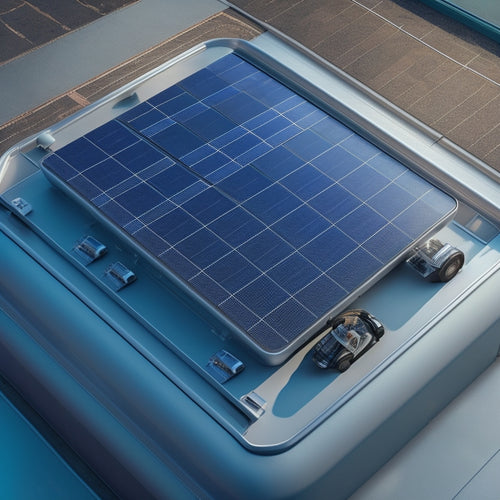
What's the Cost of Solar Panels for Your House
Share
You're likely to pay between $15,000 to $30,000 or more for a residential solar panel system, depending on the system size, panel quality, and installation costs. The average cost per watt ranges from $2.50 to $3.50. Factors like your location, roof size, and energy efficiency goals will impact the overall cost. Financing options, tax credits, and warranties can help offset expenses. To get a better sense of the cost-benefit analysis for your specific situation, consider the importance of system sizing, local incentives, and panel quality, and investigate these factors in more detail to determine the best approach for your home.
Key Takeaways
- Average solar panel installation costs range from $15,000 to $30,000 or more, depending on system size, panel quality, and installation costs.
- Financing options, such as leasing agreements, solar loans, and PPAs, can spread costs over time and make solar panels more affordable.
- Federal and state tax incentives can significantly reduce upfront expenses, with federal tax credits covering a percentage of installation costs.
- System size and quality of panels are critical factors affecting cost, with larger systems and high-efficiency panels typically being more expensive.
- Researching multiple quotes and considering long-term energy savings and ROI are essential for finding the best installation option for your house.
Understanding Solar Panel Pricing
When considering solar panels for your house, one of the most critical factors to evaluate is the cost. You'll want to understand the various financing options available, such as leasing agreements, which can help spread the cost over time.
In addition, you'll benefit from tax credits, which can greatly reduce the upfront expense. As you weigh the costs, consider the long-term energy savings and the potential return on investment. A shorter installation timeline can also impact the overall cost, so make sure to discuss this with your installer.
It's vital to review the warranty terms, which typically range from 25 to 30 years, to guarantee you're protected in case of any issues.
Moreover, think about the environmental impact of your decision, as solar panels can greatly reduce your carbon footprint. By carefully evaluating these factors, you'll be able to make an informed decision about investing in solar panels for your house.
Average Cost of Solar Panels
You're likely wondering what the average cost of solar panels is for your house.
The answer depends on three key factors: the size of the system you need, the quality of the panels you choose, and the installation costs in your area.
These variables will influence the final cost, so it's crucial to understand how they impact your overall investment.
System Size Matters
Your solar panel system's size greatly impacts its overall cost. The larger the system, the more expensive it is. However, a bigger system doesn't always mean more energy savings. You need to take into account your energy consumption and the amount of sunlight your location receives. A larger system mightn't be necessary if you live in an area with high sunlight hours.
A smaller system can be more efficient, especially if you're looking to reduce your energy bills. System efficiency is vital in maximizing energy savings. A well-designed system can provide you with significant energy savings, even with a smaller size. For instance, a 3-kilowatt system can save you around $400 to $500 per year on your energy bills.
When determining the ideal system size, you should take into account factors like your roof size, energy usage, and local building codes. A professional solar installer can help you determine the perfect system size for your specific needs, ensuring you get the most out of your solar panel investment.
Panel Quality Varies
While a well-designed system is essential to maximizing energy savings, the quality of solar panels themselves also plays a significant role in determining the overall cost of your solar panel system.
You'll find that high-quality solar panels typically come with higher price tags, but they also offer better panel efficiency. This means they can generate more power per hour of sunlight, resulting in greater energy savings over time.
When evaluating panel quality, consider warranty options. Reputable manufacturers usually offer longer warranties, typically 25 years or more, which can provide peace of mind and protect your investment.
Look for panels with high-efficiency ratings, low degradation rates, and durable construction. These features may add to the upfront cost, but they can lead to significant long-term benefits.
Keep in mind that you're not just paying for the panels themselves, but also the performance and reliability they provide.
Installation Costs Differ
Installing solar panels requires careful planning and execution, which is why installation costs can vary considerably depending on the complexity of the job. You'll want to take into account factors like the size of your system, the type of equipment used, and the installation company's labor rates. Additionally, financing options and installation timelines can impact the overall cost.
| Installation Factor | Average Cost Range |
|---|---|
| Simple Roof Installation | $2.50 - $3.50 per watt |
| Complex Roof Installation | $3.50 - $5.00 per watt |
| Ground-Mounted Installation | $3.00 - $4.50 per watt |
| Battery Backup Installation | $1,000 - $3,000 |
| Permitting and Inspection Fees | $1,000 - $2,000 |
Keep in mind that these are general estimates, and your installation costs may differ. It is crucial to research and compare quotes from multiple installation companies to find the best option for your budget and energy needs.
Factors Affecting Solar Panel Cost
When you're considering solar panels for your house, you'll find that the cost varies depending on several key factors.
The size of the system you need, which is typically measured in watts, is a significant determinant of the overall cost - the larger the system, the more expensive it'll be.
Additionally, your location and climate will also influence the cost, as systems in areas with more sunlight or extreme weather conditions may require specialized equipment or installation.
System Size Matters
In determining the cost of solar panels for your house, system size plays an essential role. The larger the system, the more energy it can produce, but it also increases the upfront cost.
You'll need to strike a balance between energy efficiency and system performance. A bigger system may not always be the best option, especially if you have limited roof space or budget constraints.
When evaluating system size, consider your energy usage and the amount of sunlight your roof receives. A system that's too small won't meet your energy needs, while one that's too large will be a waste of resources.
You can work with a solar panel professional to determine the ideal system size for your house. They'll assess your energy usage, roof size, and local building codes to recommend a system that meets your needs and budget.
Location and Climate
Your solar panel system's performance is heavily influenced by your location and climate. The amount of sunlight your area receives, the angle of the sun, and the presence of shading all impact the amount of energy your system can generate.
-
In regions with high levels of solar irradiance, such as the Southwest, your system will produce more energy, increasing the solar energy benefits you can enjoy.
-
Conversely, areas with frequent cloud cover or heavy shading will reduce your system's output, affecting your return on investment.
-
Regional energy policies also play a role, as some areas offer incentives for solar adoption, reducing the upfront cost of your system.
- Additionally, climate-related factors like extreme temperatures, humidity, and weather events can affect the durability and lifespan of your equipment, influencing the overall cost of ownership.
Cost of Solar Panel Installation
Get ready to dig deep into your pockets, as the cost of solar panel installation is a significant upfront investment. The average cost of solar panel installation in the United States ranges from $15,000 to $30,000 or more, depending on the system size, quality, and installation company.
However, you can offset this cost with federal and state tax incentives, which can provide a significant return on investment.
Fortunately, you have various financing options to evaluate. You can pay cash upfront, secure a solar loan, or opt for a power purchase agreement (PPA).
Solar loans often offer competitive interest rates and flexible repayment terms, while PPAs allow you to pay a fixed rate for the electricity generated, eliminating the need for a large upfront payment.
Regardless of the financing option you choose, the long-term benefits of solar energy, including reduced energy bills and a potential increase in your property value, can provide a substantial return on investment.
Solar Panel System Size Matters
System sizing is a critical factor in determining the overall cost-effectiveness of your solar panel installation. The size of your solar panel system will directly impact the amount of energy you can generate and save.
When it comes to system size, you'll want to evaluate the following factors:
-
Your energy usage: How much energy do you currently use, and how much do you want to offset with solar power?
-
Your roof's solar potential: How much sunlight does your roof receive, and how will this impact your system's performance?
-
System efficiency: A more efficient system will generate more power per hour of sunlight, reducing the overall system size needed to meet your energy goals.
- Energy savings goals: How much do you want to save on your energy bills, and how will this impact the size of your system?
Roof Size and Complexity
Roof size and complexity play a significant role in determining the cost of your solar panel installation. The larger your roof, the more panels you'll need, and the higher the cost.
However, it's not just about the size – the complexity of your roof also comes into play. For instance, if your roof has multiple levels, skylights, or vents, it may require more labor and materials to install the panels, increasing the cost.
You'll also need to evaluate your roof's orientation. If your roof faces east-west, you may need more panels to generate the same amount of energy as a south-facing roof. Additionally, shading issues from trees, chimneys, or neighboring buildings can reduce the efficiency of your solar panel system, requiring more panels to meet your energy needs.
Your roof's age and condition are also important factors. If your roof is old or damaged, you may need to replace it before installing solar panels, adding to the overall cost.
Local Incentives and Rebates
Now that you've considered the impact of your roof's size, complexity, and condition on your solar panel installation, it's time to examine the financial benefits that can offset these costs.
As you investigate local incentives and rebates, you'll find opportunities to reduce the upfront cost of going solar.
Some of the benefits you may be eligible for include:
- Federal tax credits: claim a percentage of your total solar panel installation cost as a credit on your taxes
- Utility incentives: your utility company may offer rebates or credits for installing solar panels
- State programs: many states offer additional incentives, such as rebates or tax credits, for residents who go solar
- Financing options: review financing plans or loans that can help spread the cost of solar panels over time
These local incentives and rebates can greatly reduce the cost of solar panels for your house.
Be sure to research the specific programs available in your area to maximize your savings.
Solar Panel Quality and Brand
As you weigh the financial benefits of going solar, it's vital to contemplate the quality and brand of the solar panels themselves, since they directly impact the performance and longevity of your solar panel system.
When evaluating brands, look for a strong reputation built on reliability, efficiency, and customer satisfaction. Panel efficiency is a significant factor, as it determines how much energy your system generates.
Opt for brands that offer high-efficiency panels with advanced technology, such as bifacial or PERC cells. Warranty coverage is also essential, providing protection against defects and performance issues. A thorough warranty should cover the product lifespan, typically 25 years or more.
Research customer reviews and ratings to gauge the brand's installation support and performance guarantees. Reputable brands will stand behind their products, ensuring your system operates at peak levels.
Ongoing Maintenance and Repair
Ongoing Maintenance and Repair
Your solar panel system's performance relies on more than just the quality of the panels themselves. To guarantee ideal energy efficiency, you'll need to take into account ongoing maintenance and repair costs.
-
Regular cleaning schedules to remove debris and dirt that can affect energy production
-
Inverter maintenance to prevent overheating and electrical issues
-
Performance monitoring to identify and troubleshoot issues promptly
- Professional inspections to guarantee system longevity and adherence to safety protocols
Warranty considerations are significant, as they can impact your maintenance and repair costs.
Seasonal adjustments may also be necessary to enhance energy production.
By staying on top of maintenance and repairs, you can prevent costly issues down the line and guarantee your system operates at peak performance.
Frequently Asked Questions
Can I Install Solar Panels on a Metal or Tile Roof?
You can install solar panels on a metal or tile roof, but consider the roof's condition and material first. Metal roof installation requires specialized mounting systems, while tile roof considerations involve ensuring waterproofing and structural integrity.
Do Solar Panels Work During a Power Outage?
During a power outage, your solar panels won't provide electricity unless you have a battery backup system installed, which guarantees continued solar panel efficiency; without it, you'll need alternative power outage solutions, like generators, to keep the lights on.
Can I Sell Excess Energy Back to the Grid?
You're likely to generate excess energy, and did you know that the US has over 1 million solar-powered homes? With net metering benefits, you can sell surplus energy back to the grid through energy buyback programs, offsetting your utility bills and even earning credits.
How Long Does a Typical Solar Panel Warranty Last?
You'll typically find that solar panel warranties last between 25 to 30 years, with some manufacturers offering performance warranties up to 40 years, and equipment warranties ranging from 10 to 15 years, ensuring a long solar panel lifespan.
Will Solar Panels Increase My Property Taxes?
You'll be interested to know that 37 states exempt solar panels from property tax assessment. As you consider solar panels, you won't see a significant hike in property taxes, and you'll still reap the solar panel benefits, like increased energy independence and a higher property value.
Related Posts
-

Charging Points in Rural Areas: 5 Key Insights
When driving through rural areas, you'll face a shortage of charging points, making EV ownership stressful and inconv...
-

Top Solar Panels for Car Battery Maintenance
When selecting top solar panels for car battery maintenance, consider high-efficiency models with high wattage output...
-

Safely Staying on Course: 5 Essential Lane Tips
You're about to take your driving skills to the next level by mastering the art of staying in your lane. First, inves...


